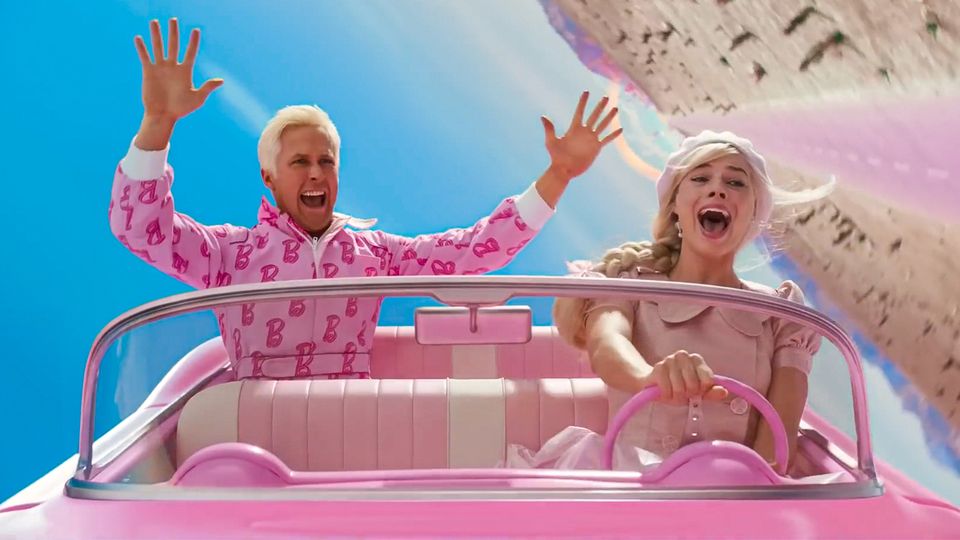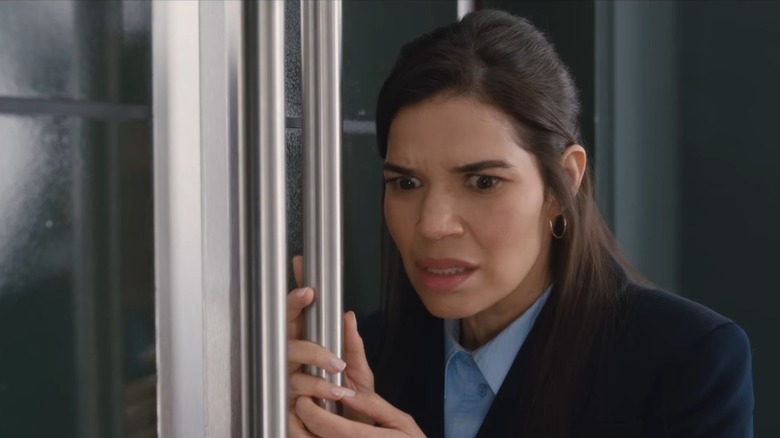
Thanks to a brilliant screenplay by Greta Gerwig and Noah Baumbach, Barbie is a spectacular marriage of the intelligent and the silly, and manages to celebrate a commercial brand amid pointed social satire. It’s delightfully funny throughout, and the third act is a crescendo of hilarity.
Gerwig and Baumbach have imagined a world in which the various versions of Barbie dolls, including Stereotypical Barbie (Margot Robbie), live in Barbie land, a female-centered but naïve, utopia. Developments force Barbie to leave Barbie Land on a mission to the human-populated Real World, and Ken (Ryan Gosling) stows away on her quest; because they live in a fantasy world, the two are unprepared for the harshness and ambiguity of the Real World, and their return to Barbie Land sparks disharmony. Will Barbie and Ken figure out their respective places in the universe?
Gerwig and Baumbach have somehow crafted a film that will satisfy those who treasure their Barbie doll, memories, those who are disturbed by Barbie’s impact on women’s body images and sexual objectification, and those who just dismiss the Barbie silliness. (I came to Barbie with one indelibly painful Barbie memory – from my bare feet stepping on Barbie shoes.) The biggest laughs come from Barbie’s relentless skewering of toxic masculinity.

Robbie and Gosling are both excellent, and there’s a huge cast of familiar stars playing various Barbies and Kens. I think that the real star of Barbie is America Ferrera, who plays Gloria, an actual human woman who befriends Barbie in the Real World. Gloria is a workaday Every Woman struggling to navigate life under the withering scorn of her teenage daughter Sasha (Ariana Greenblatt). Both Ferrera and Greenblatt deliver superlative performances, and Ferrara gets to deliver the pivotal monologue in the film.
Because much of the humor derives from surprising the audience, I am being very careful to avoid spoilers, but I can say that Barbie’s many highlights include:
- an inspired use of the Indigo Girls’ song Closer to Fine; it’s very funny to hear Barbie characters singing it, and it has the lyrics of existential inquiry, which is what Barbie is engaged in, as silly as that sounds.
- the performance of Kate McKinnon, perfectly cast as Weird Barbie.
- a hilarious turn by Michael Cera as Ken’s Friend Allen;
- a breaking-the-fourth-wall aside by narrator Helen Mirren that brings down the house.
- one of the funniest final lines of any movie comedy.
- closing credits with real Barbie toys, including the discontinued ones: Growing Up Skipper, pregnant Midge, etc.
It’s been a while since a movie made me laugh until I cried, but that happened when i watched the campfire guitar serenades and the “battle of the Kens”.
I rarely complement capitalists, but I am grateful to Warner Brothers for assigning a project that could have been simplistic, exploitative schlock to an artist like director Greta Gerwig. And Mattel is a very good corporate sport to have have its corporate culture, its CEO (Will Ferrell) and even its headquarters building thoroughly mocked.
At a minimum, Greta Gerwig and Noah Baumbach certainly deserve Oscar nominations for Original Screenplay and America Ferrara should get an Oscar nod for Supporting Actress. Barbie is one seriously funny movie.


